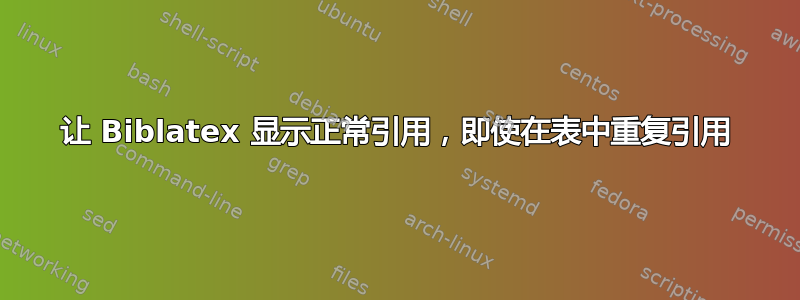
我用
\usepackage[backend=biber, natbib=true, maxbibnames=99, style=authoryear-icomp]{biblatex}
针对我的论文。当我连续两次引用同一来源时,第二次引用会显示为“ibid.”(德语为“ebd.”)。这通常没问题,但对于我的文档中的某个表格,我希望它表现得有所不同。
是否可以针对特定文本关闭此“缩写引用”?这些“同上引用”到底叫什么?我尝试在网上搜索,但发现很难,因为我不知道术语。
答案1
您可以将代码放在不希望“ibid”机制起作用的地方
\citetrackerfalse\pagetrackerfalse\backtrackerfalse
blah
\citetrackertrue\pagetrackertrue\backtrackertrue
根据您是否认为直接从此块之前的状态获取是合乎逻辑的,您可能会或可能不会添加\citereset。请参阅第 91 页和第 195 页biblatex文档了解这些命令的解释。
平均能量损失
\documentclass{article}
\usepackage[T1]{fontenc}
\usepackage[utf8]{inputenc}
\usepackage[backend=biber, natbib=true, maxbibnames=99, style=authoryear-icomp]{biblatex}
\addbibresource{biblatex-examples.bib}
\begin{document}
\cite{wilde} and \cite{wilde}
\citetrackerfalse\pagetrackerfalse\backtrackerfalse
\cite{wilde} and \cite{wilde}
\citetrackertrue\pagetrackertrue\backtrackertrue
\cite{wilde} and \cite{wilde}
\printbibliography
\end{document}

您还可以定义一个新的 cite 命令,如下所示
\DeclareCiteCommand*{\citeNT}
{\citetrackerfalse
\pagetrackerfalse
\backtrackerfalse
\usebibmacro{cite:init}%
\usebibmacro{prenote}}
{\usebibmacro{citeindex}%
\usebibmacro{citeyear}}
{}
{\usebibmacro{cite:postnote}}


